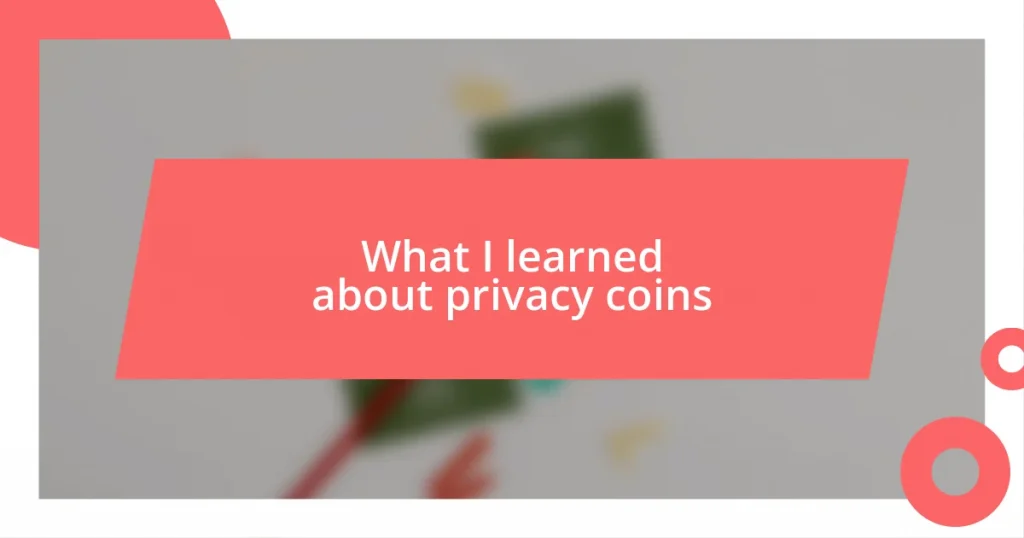Key takeaways:
- Privacy coins enhance user anonymity in transactions through technologies like ring signatures and stealth addresses, promoting financial privacy and security.
- While offering benefits such as anonymity, financial inclusion, and resilience against economic downturns, privacy coins also pose risks like regulatory scrutiny, lack of consumer protection, and price volatility.
- The future of privacy coins is likely to see increased demand, innovations in blockchain technology, and a necessity to balance privacy with regulatory compliance for broader adoption in everyday transactions.
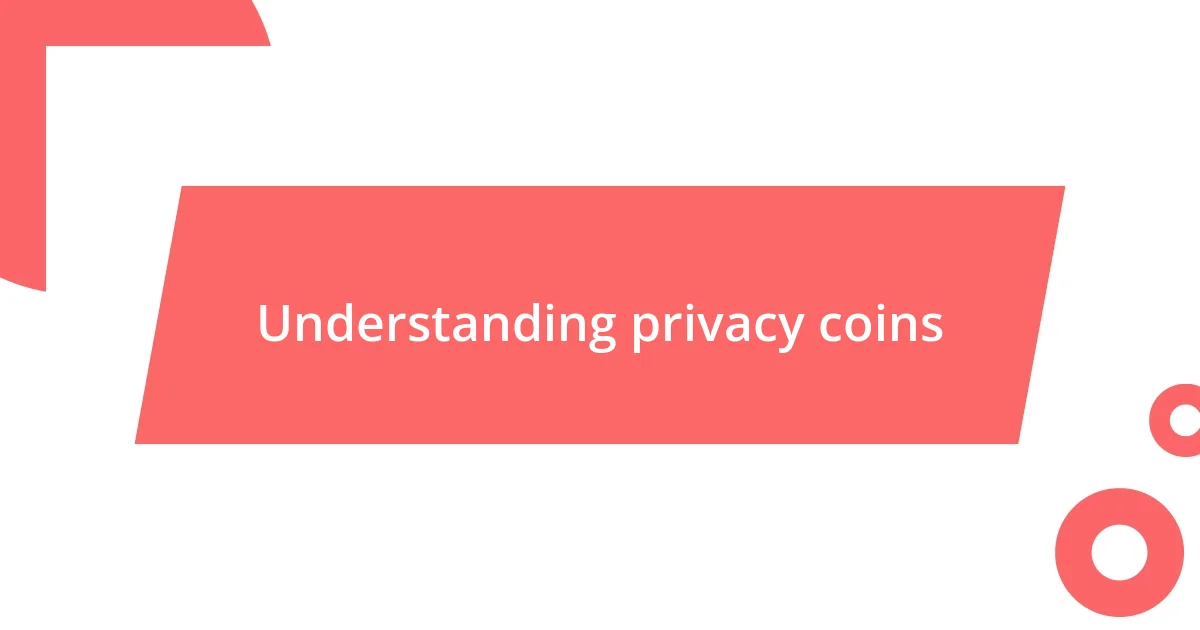
Understanding privacy coins
Privacy coins are digital currencies designed to enhance user anonymity during transactions. I remember the first time I came across Monero; it intrigued me how it employed advanced cryptographic techniques to obfuscate transaction details, preventing anyone from tracing or linking them to a user’s identity. Doesn’t it feel liberating to think about having that level of financial privacy?
The fundamental technology behind privacy coins revolves around concepts like ring signatures and stealth addresses, which create layers of security. When I first dug into how these features worked, I felt a mix of excitement and caution. It’s fascinating to think about how these tools protect users but also raises questions: How does this balance between privacy and regulatory oversight play out in our increasingly digital world?
Exploring privacy coins often leads to a deeper awareness of what it means to safeguard personal information in a highly surveilled environment. I often find myself reflecting on my own experiences with data sharing in everyday life—how many times have I inadvertently given away personal data without realizing it? Understanding the role of privacy coins in this context empowers me to make more conscious financial decisions, pushing me to weigh the value of privacy against the convenience of traditional financial systems.
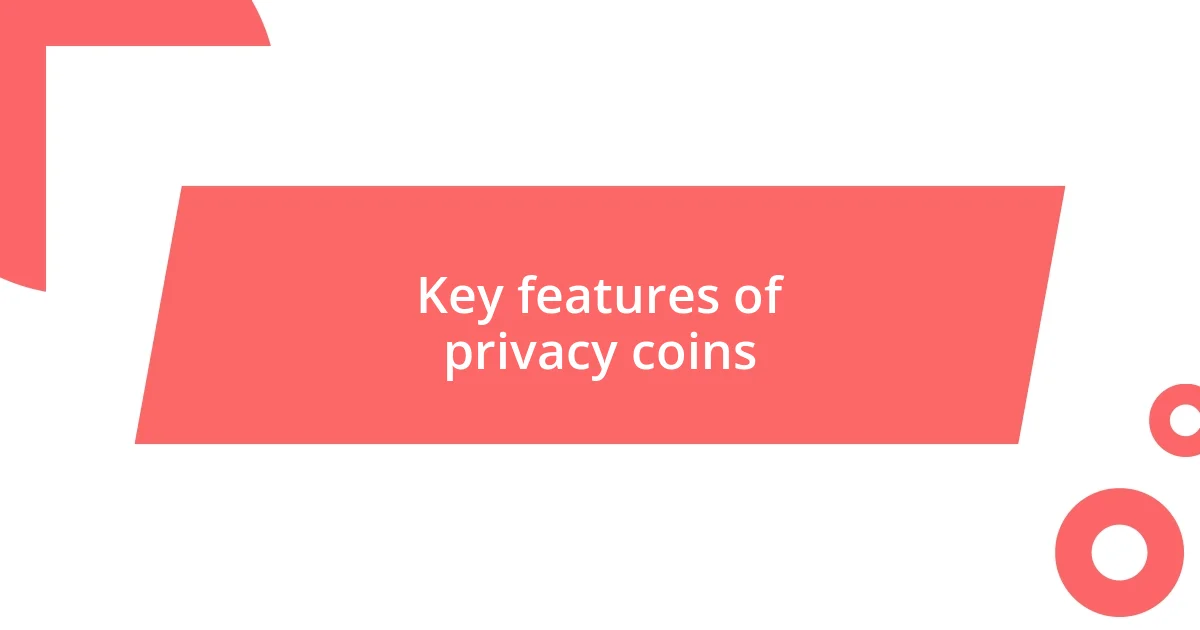
Key features of privacy coins
The distinctive elements of privacy coins are what grant them their unique stature within the cryptocurrency landscape. For instance, when I first learned about the use of zero-knowledge proofs, it blew my mind how they permit transactions to be verified without revealing the sender or receiver’s identity. It’s not just about hiding information; it’s about achieving verification while maintaining an individual’s anonymity.
Key features of privacy coins include:
- Ring Signatures: These allow transactions to be signed on behalf of a group of users, making it impossible to identify the actual signer.
- Stealth Addresses: Unique, one-time addresses generated for each transaction help keep recipients anonymous.
- Confidential Transactions: This feature conceals the transaction amounts, preventing external observers from knowing the details.
Reflecting on these features fills me with a sense of hope mixed with curiosity. I remember discussing these technologies with friends over coffee, where the conversation turned into a passionate debate about the ethics of privacy. It made me realize that privacy coins embody not only a technological revolution but also a philosophical shift in how we perceive information ownership. Understanding these functionalities is crucial—each feature serves as a reminder that financial freedom often intertwines with the ability to control one’s personal data.
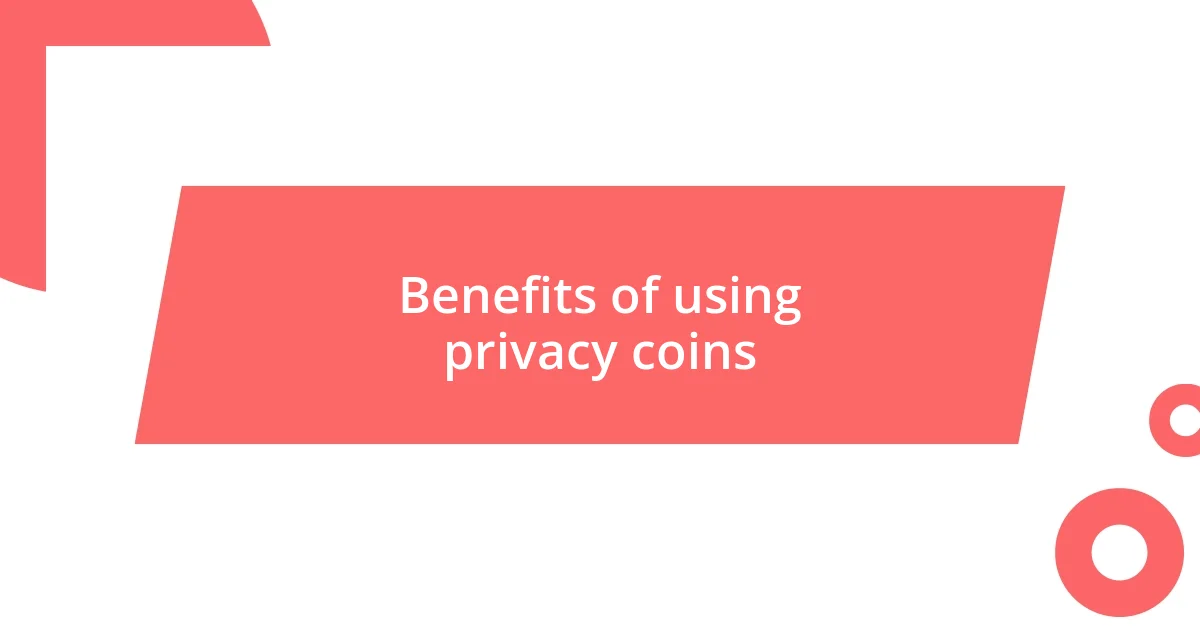
Benefits of using privacy coins
The benefits of using privacy coins extend beyond mere anonymity; they symbolize a shift towards personal freedom and security in financial transactions. I vividly recall the first moment I realized that my spending habits could remain undiscovered by not just corporations but also potential cyber threats. It felt like a weight lifted off my shoulders, knowing I had the power to protect not only my identity but also my financial decisions. Isn’t it empowering to have that level of control over one’s data?
Beyond financial privacy, these coins contribute to fostering a more inclusive financial system. I’ve experienced instances where traditional banking systems failed to support individuals in certain regions, leaving them vulnerable. By using privacy coins, people can engage in commerce without the fear of judgment or exclusion, allowing them to thrive in an ecosystem that values their participation and respects their privacy.
Lastly, the overall resilience of privacy coins presents a robust alternative in times of economic uncertainty. I once had a conversation with a friend who had invested in traditional assets during a market downturn. While he stressed over fluctuating stocks, I felt a sense of security knowing that my assets weren’t directly linked to those public markets. This resilience is not just about financial security; it’s about cultivating a mindset of stability amidst chaos. Privacy coins represent that protective shield we all could use from the unpredictable nature of the world’s financial systems.
| Benefit | Description |
|---|---|
| Anonymity | Protects user identity during transactions, keeping spending habits private. |
| Financial Inclusion | Enables unbanked individuals to participate in the economy without fear of exclusion. |
| Resilience | Offers stability against economic downturns and market volatility. |
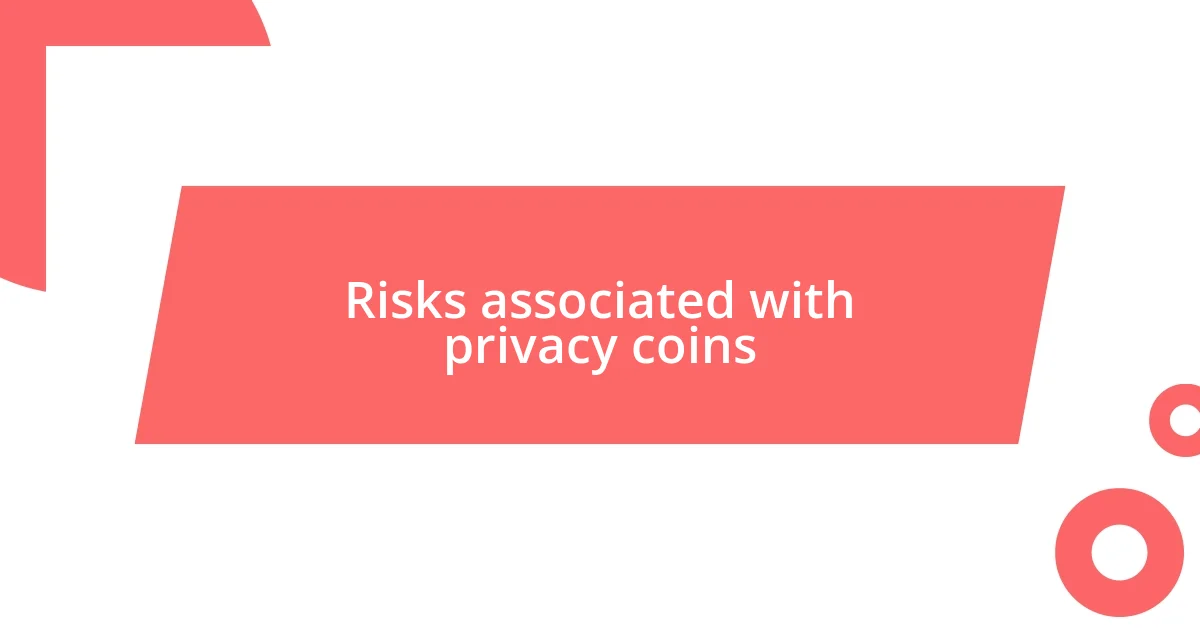
Risks associated with privacy coins
The risks associated with privacy coins are often overlooked, yet they can be quite significant. I remember when I first dabbled in using these coins, feeling empowered by my newfound anonymity. However, it quickly became apparent that this same anonymity could shelter illegal activities, leading to scrutiny and regulatory challenges. It left me wondering: is the protection of personal information worth the potential for heightened regulation?
Another pressing concern is the lack of inherent consumer protections. At one point, I encountered a situation where a swap I made using a privacy coin resulted in losing my funds due to a lack of transparency in the process. This experience taught me that the same features that offer privacy also create a challenge when trying to resolve disputes. How safe can one truly feel when the system affords little recourse in the event of a problem?
Moreover, price volatility is a critical risk that often accompanies these assets. I recall a session of watching the market on a particularly active trading day, where my stomach dropped as I saw the value of my holdings swing wildly in mere minutes. It made me realize how precarious my financial standing could become at any moment. Engaging with privacy coins can promise privacy, but the unexpected financial rollercoaster can leave you feeling disoriented and concerned about your investments.
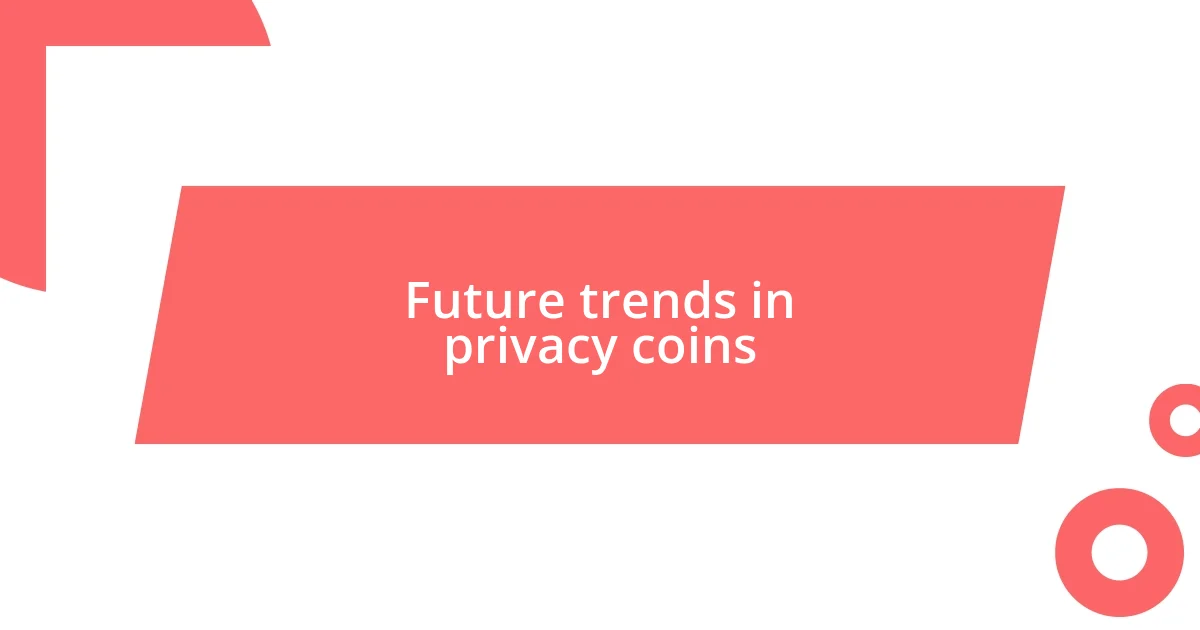
Future trends in privacy coins
As I look ahead at the landscape of privacy coins, I can’t help but feel that we’re on the verge of a significant transformation. More individuals are becoming aware of the need for privacy in their financial transactions, which means demand will likely surge. I’m curious about how innovations in blockchain technology will empower new features that enhance security. How will these advancements reshape our understanding of what privacy coins can offer?
We’ve already seen the importance of regulatory compliance beginning to surface. As privacy coins gain traction, balancing privacy with compliance will be essential for their survival. I remember debating this very point in a community forum, where opinions clashed about whether privacy should take precedence over regulation. It’s a challenging question, and I believe the coins that successfully navigate this tightrope will ultimately thrive.
Looking further into the future, I envision privacy coins playing a role in everyday transactions, much like credit cards or mobile payment systems do today. I once wondered if my daily coffee could be purchased without leaving a trace. The idea of conducting simple, everyday transactions while safeguarding my identity feels like an exciting possibility. This could usher in a new era of financial interactions, one where privacy and convenience go hand in hand.










